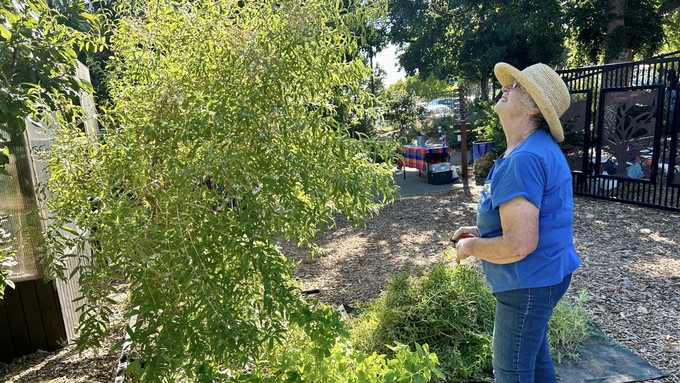
From grape pruning to worm composting, hands-on 'mini-talks' provide wealth of information -- all free!

Master gardener Vivian Sellers checks over the lemon verbena she is pruning at the Fair Oaks Horticulture Center. She and Maria Schiffler will present a mini talk on "Beyond Basil: Kitchen Herbs" (including lemon verbena) at 8:45 a.m. Saturday. Kathy Morrison
Harvest Day is all about garden education (while having fun). That’s why the Sacramento County master gardeners started this event in 1998 – to help people become better, more informed gardeners.
Set for Saturday, Aug. 3, Harvest Day 2024 offers a wealth of garden knowledge, shared by these local experts. And best of all – it’s free!
No advance registration is necessary. Just show up at the Fair Oaks Horticulture Center in Fair Oaks Park between 8 a.m. and 2 p.m. to take advantage of this event, Sacramento’s largest free garden gathering of its kind.
How big? An estimated 3,000 patrons showed up for Harvest Day 2013. Depending on the weather (how hot and how soon), this Saturday’s turnout likely will top 2,000.
In addition to featured speakers, vendors and educational tables, Harvest Day offers several “mini-talks” by master gardeners. These 30-minute presentations are held in the demonstration gardens to provide real-life examples and hands-on experiences. As always, the master gardeners are available to answer questions, too.
The hardest part? Deciding which mini-talks to attend. Fortunately, the presentations are split between only two locations, but each one has competition from another wonderful talk (in addition to the three featured speakers – Kevin Marini, Ed Laivo and Greg Gayton – at the main Speakers Tent. https://sacdigsgardening.californialocal.com/article/190071-harvest-day-2024/)
Here’s the full schedule of mini-talks (with locations):
8:45 a.m. – Tips for Successful Grape Growing.
Presented next to the Kiwi/Grape Arbor
8:45 a.m. – Beyond Basil: Kitchen Herbs
Meet at the Lower Arbor
9:30 a.m. – Why and How to Press Plants
Kiwi/Grape Arbor
9:30 a.m. – Cane Berry Pruning
Lower Arbor
10:15 a.m. – Wonderful World of Succulents
Kiwi/Grape Arbor
10:15 a.m. – Controlling Codling Moths
Lower Arbor
11 a.m. – Grapevine Propagation
Kiwi/Grape Arbor
11 a.m. – Espalier Trees
Lower Arbor
Noon – Composting with Worms
Kiwi/Grape Arbor
Noon – Amending Soil pH for Blueberries
Lower Arbor
The Fair Oaks Horticulture Center is located at 11549 Fair Oaks Blvd., Fair Oaks, in Fair Oak Park, just south of Madison Avenue.
For more on Harvest Day: https://sacmg.ucanr.edu/Harvest_Day/.
Comments
0 comments have been posted.Sacramento Digs Gardening to your inbox.
Food in My Back Yard Series
May 6: Maintain soil moisture with mulch for garden success
April 29: What's (already) wrong with my tomato plants?
April 22: Should you stock up on fertilizer? (Yes!)
April 15: Grow culinary herbs in containers
April 8: When to plant summer vegetables
April 1: Don't be fooled by these garden myths
March 25: Fertilizer tips: How to 'feed' your vegetables for healthy growth
March 18: Time to give vegetable seedlings some more space
March 11: Ways to win the fight against weeds
March 4: Potatoes from the garden
Feb. 25: Plant a fruit tree now -- for later
Feb. 18: How to squeeze more food into less space
Feb. 11: When to plant? Consider staggering your transplants
Feb. 4: Starting in seed starting
Sites We Like
Garden Checklist for week of May 11
Make the most of the lower temperatures early in the week. We’ll be back in the 80s by Thursday.
* Plant, plant, plant! It’s prime planting season in the Sacramento area. Time to set out those tomato transplants along with peppers and eggplants. Pinch off any flowers on new transplants to make them concentrate on establishing roots instead of setting premature fruit.
* Direct-seed melons, cucumbers, summer squash, corn, radishes, pumpkins and annual herbs such as basil.
* Harvest cabbage, lettuce, peas and green onions.
* In the flower garden, direct-seed sunflowers, cosmos, salvia, zinnias, marigolds, celosia and asters. (You also can transplant seedlings for many of the same flowers.)
* Plant dahlia tubers.
* Transplant petunias, marigolds and perennial flowers such as astilbe, columbine, coneflowers, coreopsis, dahlias, rudbeckia and verbena.
* Keep an eye out for slugs, snails, earwigs and aphids that want to dine on tender new growth.
* Feed summer bloomers with a balanced fertilizer.
* For continued bloom, cut off spent flowers on roses as well as other flowering plants.
* Add mulch to the garden to maintain moisture. Mulch also cuts down on weeds. But don’t let it mound around the stems or trunks of trees or shrubs. Leave about a 6-inch-to-1-foot circle to avoid crown rot or other problems.
* Remember to weed! Pull those nasties before they set seed.
* Water early in the day and keep seedlings evenly moist.